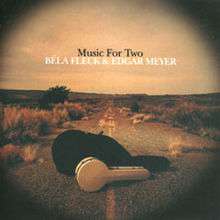Music for Two
Music for Two is an album of duets by Edgar Meyer and Béla Fleck created and recorded while touring to support Perpetual Motion and released by Sony Classical in 2004. Most of the pieces are original compositions by Meyer and Fleck, working alone and together. They also perform four of their arrangements of music by J. S. Bach, an arrangement of a sonata by Henry Eccles, and piece by Miles Davis.
| Music For Two | ||||
|---|---|---|---|---|
 | ||||
| Live album by Béla Fleck and Edgar Meyer | ||||
| Released | 2004 | |||
| Recorded | October 2001 to September 2003 | |||
| Genre | Classical/Jazz | |||
| Length | 74:01 | |||
| Label | Sony Classical | |||
| Producer | Béla Fleck, Edgar Meyer | |||
| Béla Fleck chronology | ||||
| ||||
| Review scores | |
|---|---|
| Source | Rating |
| Allmusic | |
The album includes a bonus DVD with a video documentary of the making of Music For Two from footage taken by Fleck's brother Sascha Paladino and concert footage.[2]
Track listing
- "Bug Tussle" (Béla Fleck)
- "Invention No. 10" BWV 796 (Johann Sebastian Bach - arr:Fleck, Edgar Meyer)
- "Pile-up" (Fleck, Meyer)
- Prelude No. 24 BWV 869 from The Well-Tempered Clavier, Book I (Bach - arr:Fleck, Meyer)
- "Solar" (Miles Davis)
- "Blue Spruce" (Fleck)
- "Canon" (Meyer)
- "The One I Left Behind" (Fleck)
- Menuett I-II from Partia No. 1 BWV 825 (Bach - arr:Fleck, Meyer)
- Prelude No. 2 BWV 847 from The Well-Tempered Clavier, Book I (Bach - arr:Fleck, Meyer)
- "Palmyra" (Fleck, Meyer)
- "The Lake Effect" (Fleck)
- Largo from Sonata (Henry Eccles - arr:Meyer)
- Allegro Vivace from Sonata (Eccles - arr:Meyer)
- "Wrong Number" (Fleck, Meyer)
- "Woolly Mammoth" (Fleck, Meyer)
- "Wishful Thinking" (Meyer)
Personnel
- Béla Fleck – banjo, guitar
- Edgar Meyer – double bass, piano
Chart
| Chart | Peak position |
|---|---|
| U.S. Billboard Top Classical Crossover | 3 |
gollark: Electron apps are basically just entire giant Chrome instances for one app. It's hilariously wasteful.
gollark: Is it though? Is it really?
gollark: Basically fine as long as you do not do it infinitely.
gollark: On NIs it'll always be on the back anyway, so that's not massively relevant. I might just have gotten the type wrong.
gollark: On what, the turtle or NI?
References
This article is issued from Wikipedia. The text is licensed under Creative Commons - Attribution - Sharealike. Additional terms may apply for the media files.